-
 Bitcoin
Bitcoin $106,782.3966
-0.72% -
 Ethereum
Ethereum $2,406.7764
-1.16% -
 Tether USDt
Tether USDt $1.0005
0.02% -
 XRP
XRP $2.0918
-1.53% -
 BNB
BNB $644.5785
-0.17% -
 Solana
Solana $141.0925
-0.69% -
 USDC
USDC $1.0000
0.02% -
 TRON
TRON $0.2721
0.18% -
 Dogecoin
Dogecoin $0.1585
-1.26% -
 Cardano
Cardano $0.5497
-1.14% -
 Hyperliquid
Hyperliquid $35.8493
-1.58% -
 Bitcoin Cash
Bitcoin Cash $502.3089
2.20% -
 Sui
Sui $2.7092
3.87% -
 Chainlink
Chainlink $12.8551
-1.85% -
 UNUS SED LEO
UNUS SED LEO $9.0548
0.53% -
 Stellar
Stellar $0.2344
-0.85% -
 Avalanche
Avalanche $17.2676
-0.23% -
 Toncoin
Toncoin $2.8282
0.56% -
 Shiba Inu
Shiba Inu $0.0...01113
-1.14% -
 Litecoin
Litecoin $83.9593
-0.93% -
 Hedera
Hedera $0.1447
0.82% -
 Monero
Monero $306.9022
-2.07% -
 Bitget Token
Bitget Token $4.6358
3.42% -
 Dai
Dai $0.9999
0.01% -
 Ethena USDe
Ethena USDe $1.0001
0.02% -
 Polkadot
Polkadot $3.3211
0.06% -
 Uniswap
Uniswap $6.8775
0.75% -
 Pi
Pi $0.5664
-0.27% -
 Aave
Aave $256.0055
1.28% -
 Pepe
Pepe $0.0...09013
-3.24%
Does Bitcoin wallet address require real name? Anonymity discussion
Bitcoin wallet addresses don't need real names, enhancing user anonymity, but using exchanges with KYC can link addresses to identities, reducing privacy.
May 12, 2025 at 11:49 pm
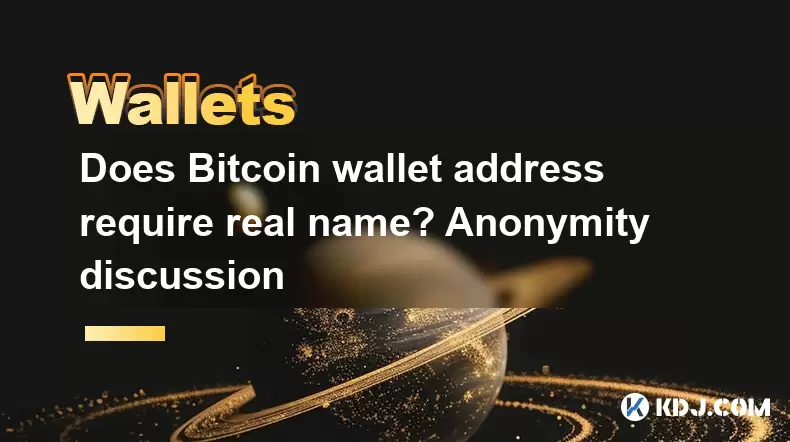
The question of whether a Bitcoin wallet address requires a real name is central to understanding the balance between privacy and transparency in the cryptocurrency world. Bitcoin wallet addresses do not inherently require a real name. This feature is one of the reasons why Bitcoin and other cryptocurrencies are often associated with a degree of anonymity. However, the level of anonymity can vary depending on how the wallet is used and the services associated with it.
Understanding Bitcoin Wallet Addresses
A Bitcoin wallet address is a unique identifier that represents a possible destination for a Bitcoin payment. It is a string of alphanumeric characters, typically 26-35 characters long, and is generated from the public key of a user's Bitcoin wallet. The creation of a Bitcoin wallet address does not require any personal information, including a real name. This means that anyone can generate a Bitcoin wallet address without revealing their identity.
Anonymity in Bitcoin Transactions
When you send or receive Bitcoin, the transaction is recorded on the public blockchain, which is a transparent ledger of all Bitcoin transactions. While the transactions are public, the identities of the parties involved are not directly linked to the wallet addresses. This pseudo-anonymity means that while the transactions are visible, the real-world identities of the users are not necessarily known.
However, anonymity can be compromised if a wallet address is linked to a real-world identity. This can happen through various means, such as using a Bitcoin exchange that requires KYC (Know Your Customer) verification, or if a user voluntarily discloses their wallet address in connection with their real name.
Bitcoin Exchanges and KYC Requirements
Many Bitcoin exchanges require users to complete a KYC process, which involves providing personal information, including a real name, to comply with anti-money laundering (AML) and counter-terrorism financing (CTF) regulations. When you deposit or withdraw Bitcoin from such an exchange, your wallet address can be linked to your real identity. This means that while the Bitcoin wallet address itself does not require a real name, the use of certain services can compromise your anonymity.
Enhancing Anonymity with Bitcoin
If maintaining anonymity is a priority, there are several strategies that users can employ to enhance their privacy:
- Use of multiple wallet addresses: By generating and using multiple wallet addresses for different transactions, you can make it more difficult for others to track your activities.
- Mixing services: Bitcoin mixing services, also known as tumblers, can help obscure the trail of transactions by mixing your coins with those of other users.
- Privacy-focused wallets: Some wallets, such as Wasabi Wallet and Samourai Wallet, are designed with privacy in mind and offer features like coin joining to enhance anonymity.
Risks and Considerations
While anonymity can be a valuable feature, it is important to be aware of the potential risks and legal considerations. Engaging in illegal activities using Bitcoin can lead to severe consequences, even if you attempt to maintain anonymity. Additionally, some jurisdictions have strict regulations regarding the use of cryptocurrencies, and failing to comply with these regulations can result in legal action.
Practical Steps to Maintain Anonymity
If you wish to maintain anonymity while using Bitcoin, here are some practical steps you can follow:
Generate a new wallet address for each transaction: This can be done easily with most Bitcoin wallets. For example, in the Bitcoin Core wallet:
- Open the Bitcoin Core application.
- Click on "File" and then "Receiving addresses."
- Click on "New" to generate a new address.
- Use this new address for your transaction.
Use a VPN: A Virtual Private Network (VPN) can help mask your IP address, adding an extra layer of privacy.
- Choose a reputable VPN provider.
- Install the VPN software on your device.
- Connect to a server in a different country before accessing your Bitcoin wallet or making transactions.
Avoid linking your wallet address to your real identity: Do not share your wallet address on social media or other platforms where it could be linked to your real name.
- Be cautious when using Bitcoin exchanges that require KYC.
- Consider using decentralized exchanges (DEXs) that do not require personal information.
Conclusion on Bitcoin Wallet Address Anonymity
In summary, a Bitcoin wallet address does not require a real name, and this feature contributes to the pseudo-anonymity of Bitcoin transactions. However, the level of anonymity can be affected by the services you use and how you manage your wallet addresses. By understanding these factors and taking appropriate measures, you can enhance your privacy while using Bitcoin.
Frequently Asked Questions
Q: Can law enforcement trace Bitcoin transactions to real identities?
A: Yes, law enforcement agencies can trace Bitcoin transactions to real identities if they are able to link a wallet address to a person through KYC data from exchanges, IP address tracking, or other means. However, this requires significant investigative resources and is not always straightforward.
Q: Are there any completely anonymous cryptocurrencies?
A: Some cryptocurrencies, such as Monero and Zcash, are designed with stronger privacy features and are often considered more anonymous than Bitcoin. However, no cryptocurrency can guarantee complete anonymity, as there are always potential vulnerabilities and methods for de-anonymization.
Q: Can I use Bitcoin anonymously on the dark web?
A: While Bitcoin can be used on the dark web, it is not inherently anonymous. Using Bitcoin on the dark web can still leave traces that could potentially be linked to your real identity. For enhanced anonymity, users often turn to privacy-focused cryptocurrencies like Monero.
Q: What are the risks of using Bitcoin for illegal activities?
A: Using Bitcoin for illegal activities carries significant risks, including legal consequences. Even if you attempt to maintain anonymity, law enforcement agencies have tools and methods to trace transactions and identify perpetrators. Additionally, engaging in illegal activities can lead to the seizure of your assets and criminal charges.
Disclaimer:info@kdj.com
The information provided is not trading advice. kdj.com does not assume any responsibility for any investments made based on the information provided in this article. Cryptocurrencies are highly volatile and it is highly recommended that you invest with caution after thorough research!
If you believe that the content used on this website infringes your copyright, please contact us immediately (info@kdj.com) and we will delete it promptly.
- Smart Investors Navigate the AI Token Frenzy: Bitcoin Switch and Beyond
- 2025-06-28 12:30:12
- Crypto in 2025: How Web3 AI is Poised to Dominate
- 2025-06-28 12:30:12
- Crypto 2025: Spotting the Top Coins with Real Utility
- 2025-06-28 12:42:12
- Pepe Price's Wild Ride: Cryptocurrency Milestone or Just Another Meme?
- 2025-06-28 12:42:13
- BDAG Airdrop Heats Up as ADA Dips and AVAX Eyes Gains: What's the Buzz?
- 2025-06-28 10:30:12
- Crypto, Bitcoin, Buy Now: Navigating the Bullish Breakout
- 2025-06-28 10:30:12
Related knowledge

How to stake cryptocurrencies on Coinbase? Benefits and risks
Jun 27,2025 at 06:36pm
Understanding Cryptocurrency Staking on CoinbaseStaking cryptocurrencies involves locking up digital assets to support the operations of a blockchain network, typically in return for rewards. Coinbase, one of the most popular cryptocurrency exchanges globally, offers staking services for several proof-of-stake (PoS) coins. Users can stake their holdings...
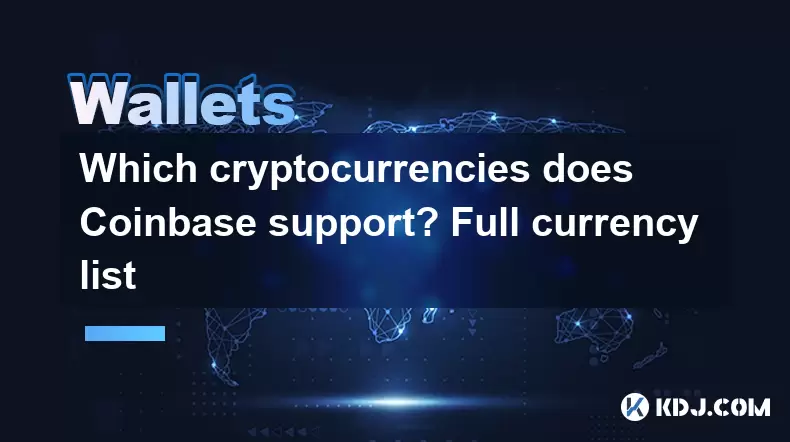
Which cryptocurrencies does Coinbase support? Full currency list
Jun 28,2025 at 08:36am
Overview of Cryptocurrencies Supported by CoinbaseCoinbase is one of the most popular and trusted cryptocurrency exchanges globally. It provides users with a platform to buy, sell, trade, and store various digital assets. As of the latest updates, Coinbase supports over 200 cryptocurrencies, including major ones like Bitcoin (BTC), Ethereum (ETH), and L...
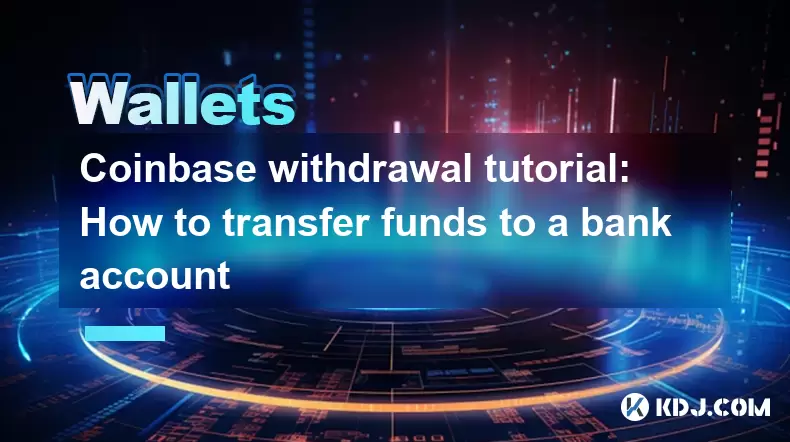
Coinbase withdrawal tutorial: How to transfer funds to a bank account
Jun 28,2025 at 02:35am
Understanding Coinbase WithdrawalsCoinbase is one of the most widely used cryptocurrency platforms, allowing users to buy, sell, and store digital assets. Once you've successfully traded or held your crypto on Coinbase, the next logical step may be to withdraw funds to a bank account. This process involves converting your cryptocurrency into fiat curren...
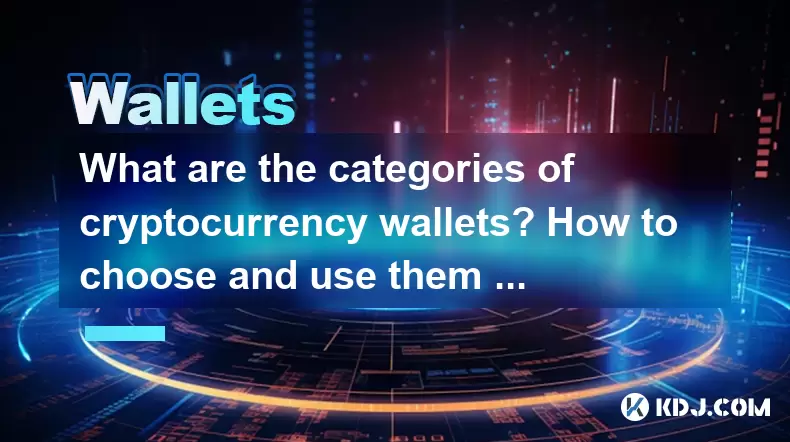
What are the categories of cryptocurrency wallets? How to choose and use them safely?
Jun 21,2025 at 10:42pm
Understanding Cryptocurrency WalletsCryptocurrency wallets are essential tools for anyone involved in the digital asset ecosystem. They allow users to store, send, and receive cryptocurrencies securely. Unlike traditional wallets that hold physical money, crypto wallets manage cryptographic keys—private and public—which interact with blockchain networks...
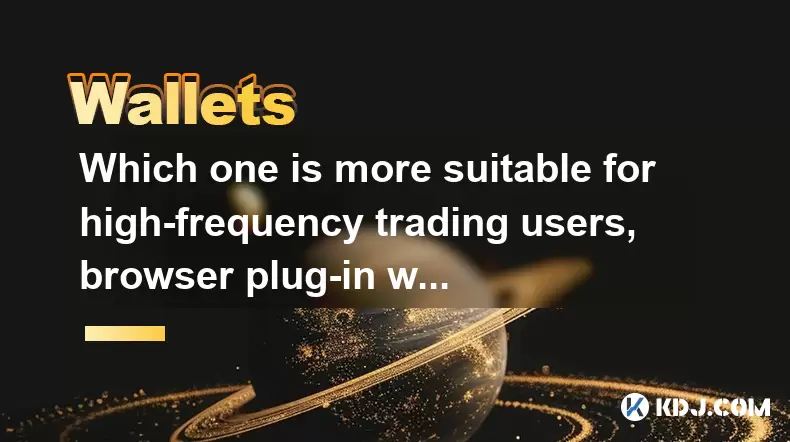
Which one is more suitable for high-frequency trading users, browser plug-in wallets or independent application wallets?
Jun 23,2025 at 08:22am
Understanding the Role of Wallets in High-Frequency TradingFor high-frequency trading (HFT) users in the cryptocurrency market, wallet selection is critical due to the need for speed, security, and seamless integration with trading platforms. HFT involves executing a large number of trades within seconds or even milliseconds, which demands a wallet that...

What are the differences between the operating mechanisms of on-chain wallets and off-chain wallets? Is there a big difference in transaction fees?
Jun 25,2025 at 08:49am
Understanding On-Chain WalletsOn-chain wallets are digital wallets that directly interact with the blockchain network. These wallets store users' private keys, which are essential for signing and authorizing transactions on the blockchain. When using an on-chain wallet, every transaction must be recorded and verified by the decentralized nodes in the ne...

How to stake cryptocurrencies on Coinbase? Benefits and risks
Jun 27,2025 at 06:36pm
Understanding Cryptocurrency Staking on CoinbaseStaking cryptocurrencies involves locking up digital assets to support the operations of a blockchain network, typically in return for rewards. Coinbase, one of the most popular cryptocurrency exchanges globally, offers staking services for several proof-of-stake (PoS) coins. Users can stake their holdings...

Which cryptocurrencies does Coinbase support? Full currency list
Jun 28,2025 at 08:36am
Overview of Cryptocurrencies Supported by CoinbaseCoinbase is one of the most popular and trusted cryptocurrency exchanges globally. It provides users with a platform to buy, sell, trade, and store various digital assets. As of the latest updates, Coinbase supports over 200 cryptocurrencies, including major ones like Bitcoin (BTC), Ethereum (ETH), and L...

Coinbase withdrawal tutorial: How to transfer funds to a bank account
Jun 28,2025 at 02:35am
Understanding Coinbase WithdrawalsCoinbase is one of the most widely used cryptocurrency platforms, allowing users to buy, sell, and store digital assets. Once you've successfully traded or held your crypto on Coinbase, the next logical step may be to withdraw funds to a bank account. This process involves converting your cryptocurrency into fiat curren...

What are the categories of cryptocurrency wallets? How to choose and use them safely?
Jun 21,2025 at 10:42pm
Understanding Cryptocurrency WalletsCryptocurrency wallets are essential tools for anyone involved in the digital asset ecosystem. They allow users to store, send, and receive cryptocurrencies securely. Unlike traditional wallets that hold physical money, crypto wallets manage cryptographic keys—private and public—which interact with blockchain networks...

Which one is more suitable for high-frequency trading users, browser plug-in wallets or independent application wallets?
Jun 23,2025 at 08:22am
Understanding the Role of Wallets in High-Frequency TradingFor high-frequency trading (HFT) users in the cryptocurrency market, wallet selection is critical due to the need for speed, security, and seamless integration with trading platforms. HFT involves executing a large number of trades within seconds or even milliseconds, which demands a wallet that...

What are the differences between the operating mechanisms of on-chain wallets and off-chain wallets? Is there a big difference in transaction fees?
Jun 25,2025 at 08:49am
Understanding On-Chain WalletsOn-chain wallets are digital wallets that directly interact with the blockchain network. These wallets store users' private keys, which are essential for signing and authorizing transactions on the blockchain. When using an on-chain wallet, every transaction must be recorded and verified by the decentralized nodes in the ne...
See all articles























































































